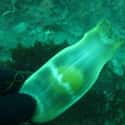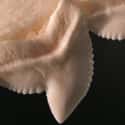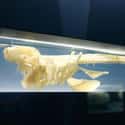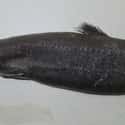-
(#1) Some Sharks Can Walk On Land
Four new species of walking sharks were discovered in northern Australia and New Guinea in January 2020. Scientists from several research institutions spent 12 years studying walking sharks before announcing the new species. According to Mark Erdmann of Conservation International, the "bottom-dwelling sharks actually walk using their pectoral and pelvic fins" rather than swim, which allows them to "poke their heads under coral and rocks as they look for small fish, snails, and crustaceans to eat."
The walking sharks evolved just 12 million years ago, and are therefore the youngest shark species known to man. In 2016, scientists reported nine species of walking sharks. The four new species were found in what's called "Bird's Head Seascape," where they may have "hitched a ride on a drifting island." Apparently, the small, patterned animals cannot move across deep waters because they are unable to swim, so the only way for them to travel to distant locations is for their reefs to move.
Though they live on the ocean floor, walking sharks can in fact walk on dry land. They are not a threat to anyone other than "small crustaceans and mollusks."
-
(#2) Female Sharks Fertilize Eggs Without A Male
Most species require both a male and a female to create life, but sharks are not like most species. Thanks to a phenomenon known as parthenogenesis, female sharks can breed once and store the collected sperm until a later date for self-reproduction. Female sharks do this for protection during the mating season because males are especially ferocious when it comes to mating, as they tend to bite and injure females while participating in courtship rituals.
-
(#3) Sharks Use Electric Fields To Detect The Heartbeat Of Prey
Sharks have special sensory organs known as ampullae of Lorenzini, which are deep pores found around their snouts. The ampullae are sensitive electroreceptors that help with hunting. A shark uses this electroreception sensory system to detect electrical activity that fluctuates from its prey, such as a creature’s beating heart.
-
(#4) Sharks Have Roamed The Earth's Waters For Over 419 Million Years
Sharks have been around for over 419 million years and have adapted to increase their survival rates. For example, the great white is recorded as the largest predatory fish in the ocean, averaging 15 to 20 feet long. While great whites may sound intimidating in stature, there was an even larger predatory shark that lived millions of years ago called the megalodon.
Megalodons resembled the great white in every aspect, save for its immense size. In length alone, the megalodon was said to have grown up to 59 feet!
-
(#5) A Shark's Line Of Sight Is Almost 360 Degrees
Sharks have extremely strong vision. In fact, a shark can see ten times better than a human, as far as over 100 feet away. Sharks have panoramic viewing capabilities and usually have three minor blind spots that limit their visual perception. Most are blind to whatever is directly in front of their nose, so sharks swing their heads back and forth as they swim in an effort to eliminate that blind spot.
Sharks can also effectively change their field of vision from stereoscopic (three dimensional viewing) to monocular (one eye viewing), which sacrifices perception for quality of vision.
-
(#6) Sharks Can Regrow Their Teeth
Sharks are known for their powerful jaws and rows of razor sharp teeth. The great white has over 300 teeth in their mouths at one time, with some laying beneath the gum line waiting to push to the surface and replace any teeth that will fall out.
Shark teeth are not attached to the gum line with a root, which allows them to grow and replace any lost teeth daily. In addition to their crazy dental disposition, sharks can also dislocate their upper jaws (and put them back in place) to widen their bite.
-

(#7) You Are More Likely To Be Taken Out By A Coconut Than A Shark
While you may be afraid of swimming in the ocean because of sharks, the truth is sharks are less lethal than you think. Research even shows that sharks honestly don't like the taste of human flesh, but attack out of confusion (you may resemble a seal). In fact, you're more likely to be injured or ended by a falling coconut or a mosquito than by a shark!
What's even more odd is that you're more likely to be injured or ended by a toilet-related accident than by a shark. Reports from 1996 show that over 43,000 Americans were injured in a toilet-related incident within that year, while shark injuries involved a mere 13 human-related incidents. Shark-related deaths are low, only averaging about 10 a year, which is less than one a month.
-
(#8) Shark Teeth Are Cleaner Than You Think
After eating schools of fish and devouring oceanic carcasses, you would think that shark teeth were far from being pearly white. But in actuality, a shark’s teeth are cleaner than you would expect because shark teeth are covered in fluoride. This makes them cavity-resistant against bacteria.
Add that to the fact that sharks replace their teeth consistently and the result is some major dental protection.
-
(#9) Mako Sharks Can Travel As Fast As 46 MPH
If the cheetah were a fish, it might be a mako shark. The shortfin mako is reported as being the fastest shark in the world’s oceans. These sleek creatures can attain bursts of speed as high as 46 mph. This has dubbed the species with the title "cheetah of the sea," as the cheetah can reach speeds of 60 to 70 mph.
The secret to the shortfin mako's speed lies in its scales, used to make sharp turns. In addition, their fast speed even allows them to propel out of the water and jump up to 20 feet in the air!
-
(#10) Sharks Can Sense Blood In The Water Over Half A Mile Away
You may have heard that sharks are attracted to blood in the ocean, but did you know they can smell a few drops of blood in the water from as far as half a mile away? Sharks have a keen sense of smell, thanks to their highly developed sensors known as olfactory receptors. When the scent of blood molecules passes over the shark's sensors, it immediately knows where to turn to follow the trail.
-

(#11) Some Sharks Can Heat Up Their Eyeballs To See Better
Most sharks are cold-blooded in biology, but there are some sharks, such as makos and great whites (classified as Laminids) that have the ability to generate their own heat. This helps them maintain their body temperature as the ocean temperature changed. In addition, Laminids can also use this ability to heat up their brains and eyeballs to improve vision.
-
(#12) Sharks Have No Bones
Sharks are certainly not spineless creatures, though they are boneless. A shark's skeletal system is made up of cartilage, a strong and flexible material that is less dense than bone. Because sharks don't have a "swim bladder," meaning they don't have an internal system to maintain buoyancy, having a cartilage skeleton requires less energy to stay afloat and not sink to the bottom of the ocean.
If a shark were to die, the chances of finding its skeletal remains are slim because the salt in the water is likely to erode the cartilage at a rapid pace.
-
(#13) Some Sharks Are Considered Safe To Swim With
Many sharks couldn't care less about you swimming among them. These types of sharks, like the whale shark and the nurse shark, are actually quite gentle and generally ignore humans who respect their personal space. But remember, provoking or pestering any animal can cause them to react violently, so please act responsibly.
-
(#14) Tiger Shark Pups Eat Their Unborn Siblings
A pregnant tiger shark has not one uterus, but two uteri with which she will birth two live pups. However, upon conception, tiger sharks actually carry up to 12 healthy embryos in their womb. So why only two babies? While in the mother’s womb, the first tiger pups to emerge from their embryonic sacks will eat their siblings.
It had long been suggested that this bloody act of sibling carnage was just survival of the fittest. However, research shows that a mother typically mates with multiple males, which results in the embryos developing at different stages. The oldest babies thus emerge first, usually hungry, and end up eating their siblings.
-
(#15) Latern Sharks Glow In The Dark
The lantern sharks are a species that are rarely seen. In fact, they enjoy living in the furthest depths of the ocean’s dark waters. Lantern sharks have the amazing ability to glow in the dark and appear invisible to predators below them. When they light up, they let off a soft, luminous glow that is produced by organs called photophores. Researchers believe the sharks may be glowing to attract a mate and to ward off or hide from predators.
New Random Displays Display All By Ranking
About This Tool
After rendering in various movies and books, the shark has become a symbol of the killer. Sharks are a kind of ancient cartilaginous fishes that live in the ocean, It is a group of fastest medium and large marine fish whose huge bodies and their status as predators at the top of the food chain really make them one of the overlords in the ocean. Learn more about sharks is the first step in taking protective measures.
The random tool lists 15 fascinating facts about sharks that you may never know, welcome to share this important knowledge with friends. You could also search for other interesting topics in this tool.
Our data comes from Ranker, If you want to participate in the ranking of items displayed on this page, please click here.























